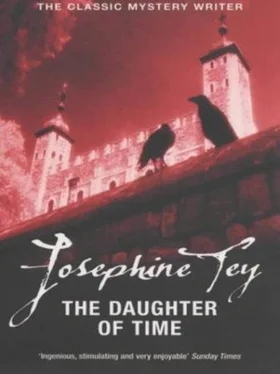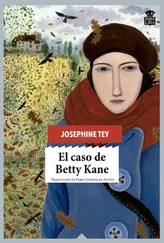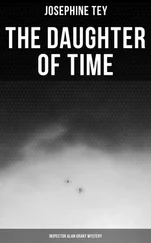She glanced behind her at the three younger children who had come out in her wake; Margaret and George, the two solid fair ones, and behind them, a pace in the rear as always, her changeling baby, Richard; his dark brows and brown hair making him look like a visitor. Good-natured untidy Margaret watched with all the moist-eyed emotion of fourteen; George in a passionate envy and wild rebellion that he was only eleven and of no consequence to this martial moment. Thin little Richard showed no excitement at all, but his mother thought that he vibrated like a softly tapped drum.
The three horses moved out of the courtyard in a clatter of slipping hooves and jingling accoutrements, to join the servants waiting for them in the roadway, and the children called and danced and waved them out of the gate.
And Cicely, who in her time had seen so many men, and so many of her family, go off to went back to the house with an unaccustomed weight at her bosom. Which of them, said the voice in her unwilling mind, which of them was it who was not coming back?
Her imagination did not compass anything so horrible as the fact that none of them was coming back again. That she would never see any one of them again.
That before the year was ended her husband’s severed head, crowned for insult with a paper crown, would be nailed above the Micklegate Bar in York, and the heads of her brother and her son on the two other gates.
Well, that might be fiction, but it was an illuminating glimpse of Richard. The dark one in a blond family. The one who ‘looked like a visitor’. The ‘changeling’.
He abandoned Cicely Nevill for the moment, and went hunting through the book for her son Richard. But Miss Payne-Ellis seemed not to be greatly interested in Richard. He was merely the tail-end of the family. The magnificent young creature who flourished at the other end was more to her taste. Edward was much to the fore. With his Nevill cousin Warwick, Salisbury’s son, he won the battle of Towton, and, with the memory of Lancastrian ferocity still fresh and his father’s head still nailed to the Micklegate Bar, gave evidence of that tolerance that was to be characteristic of him. There was quarter at Towton for all who asked. He was crowned King of England in Westminster Abbey (and two small boys, home from exile in Utrecht, were created respectively Duke of Clarence and Duke of Gloucester). And he buried his father and his brother Edmund with great magnificence in the church at Fotheringhay (though it was Richard, aged thirteen, who convoyed that sad procession from Yorkshire, through the bright glory of five July days, to Northamptonshire; nearly six years after he had stood on the steps of Baynard’s Castle in London to watch them ride away).
It was not until Edward had been King for some time that Miss Payne-Ellis allowed Richard to come back into the story. He was then being educated with his Nevill cousins at Middleham, in Yorkshire.
As Richard rode into the shadow of the keep, out of the broad sunlight and flying winds of Wensleydale, it seemed to him that there was an atmosphere of strangeness about the place. The guards were talking in loud excitement in the gatehouse and seemed abashed at his presence. From their sudden silence he rode on into a silent court that should have been bustling with activity at this hour of the day. It would soon be supper time, and both habit and hunger brought all the inhabitants of Middleham home from their various occupations, as they were bringing him back from his hawking, for the evening meal. This hush, this desertion, was unusual. He walked his horse to the stables, but there was no one there to give it to. As he unsaddled he noticed a hard-ridden bay in the next stall; a horse that did not belong to Middleham; a horse so tired that he had not eaten up and his head hung in a despondent beaten way between his knees.
Richard wiped his horse down and rugged him, brought him some hay and fresh water, and left him; wondering about that beaten horse and the uncanny silence. As he paused in the doorway he could hear voices in the distance of the great hall; and debated whether he should go there and investigate before going upstairs to his own quarters. As he hesitated a voice from the stairs above him said: ‘Z-z-zt!’
He looked up to see his cousin Anne’s head peering over the banisters, her two long fair plaits hanging down like bell-ropes.
‘Richard!’ she said, half whispering. ‘Have you heard?’
‘Is something wrong?’ he asked. ‘What is it?’
As he moved up to her she grabbed his hand and dragged him upwards towards their schoolroom in the roof.
‘But what is it?’ he asked, leaning back in protest against her urgency. ‘What has happened? Is it something so awful that you can’t tell me here!’
She swept him into the schoolroom and shut the door.
‘It’s Edward!’
‘Edward? Is he ill?’
‘No! Scandal!’
‘Oh,’ said Richard, relieved. Scandal and Edward were never far apart. ‘What is it? Has he a new mistress?’
‘Much worse than that! Oh, much, much worse. He’s married.’
‘Married?’ said Richard, so unbelieving that he sounded calm. ‘He can’t be.’
‘But he is. The news came from London an hour ago.’
‘He can’t be married,’ Richard Insisted. ‘For a King marriage is a long affair. A matter of contracts, and agreements. A matter for Parliament, even, I think. What made you think he had got married?’
‘I don’t think,’ Anne said, out of patience at this sober reception of her broadside. ‘The whole family is raging together in the Great Hall over the affair.’
‘Anne! have you been listening at the door?’
‘Oh, don’t be so righteous. I didn’t have to listen very hard, anyhow. You could hear them on the other side of the river. He has married Lady Grey!’
‘Who is Lady Grey? Lady Grey of Groby?’
‘Yes.’
‘But he can’t. She has two children and she is quite old.’
‘She is five years older than Edward, and she is wonderfully beautiful so I overhear.’
‘When did this happen?’
‘They’ve been married for five months. They got married in secret down in Northamptonshire.’
‘But I thought he was going to marry the King of France’s sister.’
‘So,’ said Anne in a tone full of meaning ‘did my father.’
‘Yes; yes, it makes things very awkward for him, doesn’t it; after all the negotiating.’
‘According to the messenger from London he is throwing fits. It isn’t only the making him look a fool. It seems she has cohorts of relations and he hates every one of them.’
‘Edward must be possessed.’ In Richard’s hero-worshipping eyes everything Edward did had always been right. This folly, this undeniable, this inexcusable folly, could come only from possession.
‘It will break my mother’s heart,’ he said. He thought of his mother’s courage when his father and Edmund had been killed, and the Lancastrian army was almost at the gates of London. She had not wept nor wrapped herself in protective veils of self-pity. She had arranged that he and George should go to Utrecht, as if she were arranging for them to go away to school. They might never see each other again, but she had busied herself about warm clothes for their winter voyage across the Channel with a calm and dry-eyed practicality.
How would she bear this; this further blow? This destructive folly. This shattering foolishness.
‘Yes,’ said Anne, softening. ‘Poor Aunt Cecily. It is monstrous of Edward to hurt everyone so. Monstrous.’
But Edward was still the infallible. If Edward had done wrong it was because he was ill, or possessed, or bewitched. Edward still had Richard’s allegiance; his heart-whole and worshipping allegiance.
Читать дальше












